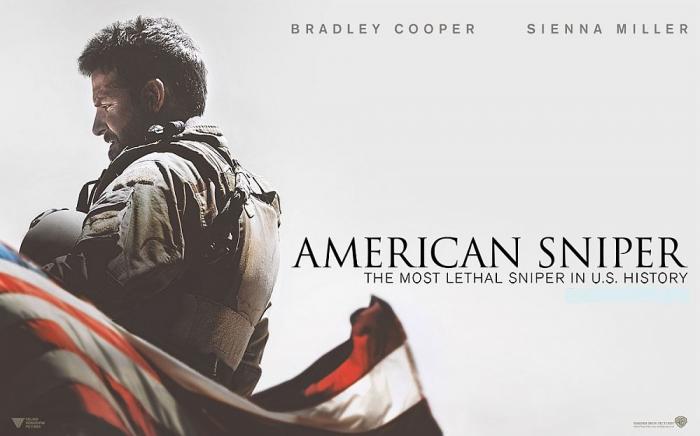Eastwood and Cooper Hit The Bullseye With "American Sniper"
FTC Statement: Reviewers are frequently provided by the publisher/production company with a copy of the material being reviewed.The opinions published are solely those of the respective reviewers and may not reflect the opinions of CriticalBlast.com or its management.
As an Amazon Associate, we earn from qualifying purchases. (This is a legal requirement, as apparently some sites advertise for Amazon for free. Yes, that's sarcasm.)

I could use clichéd terms like “mesmerizing,” “stunning,” and “incredible” to describe Clint Eastwood’s latest directorial effort, “American Sniper.” They would be fitting adjectives, but they wouldn’t quite do the film justice. You see, Clint Eastwood doesn’t make bad movies. He makes near-perfect movies, each one simple and straightforward in presentation, yet featuring complete and complex characters. The man is a living legend, just like Chris Kyle, the subject of this challenging but wholly worthwhile film was during his service to his country.
Chief Petty Officer Chris Kyle, sniper, United States Navy SEALs, ranks as the deadliest sniper in U.S. military history. He served four tours in Iraq, earning the nickname “Legend” among the Marines and Army infantry he covered with his McMillan TAC-338 sniper rifle, as well as the less flattering Shaitan Ar-Ramadi or “Devil of Ramadi” and a substantial bounty believed to be in the low six figures. He had 160 confirmed kills of enemy combatants during his military career and nearly 100 more probable kills. That’s a lot of killing. The intensity of his mission, day in and day out, for approximately 1,000 days on the front lines, would certainly change a person. Kyle was no exception.
Bradley Cooper is often thought of as a heartthrob who can be relied upon to lead successful romantic comedies, or as “The Hangover” trilogy’s irascible ringleader. Most recently, he voiced the scene-stealing space raccoon Rocket in Marvel’s “Guardians of the Galaxy.” Cooper is an actor, not just a handsome guy for women to swoon over. “American Sniper” shows Cooper at his best yet, a buff elite soldier and a troubled vet trying to readjust to civilian life after spending years in a warzone. As Chris Kyle, he exhibits thoughtfulness, tenderness, command, and trepidation, all with a respectable Texan drawl for a Philadelphian. It was a tense, soul-tingling moment when he’s got an eight year old kid in his sights, begging in a private whisper for the boy to putdown the rocket launcher he was struggling to shoulder. I won’t tell you what happens, but every hair on my arms was standing at attention as Cooper’s finger quivered on that trigger.
Much like Peter Berg’s “Lone Survivor” film two years ago, Eastwood’s “American Sniper” is at times uncomfortable to watch. The veteran master of American cinema crafted a less visceral, more cerebral story. Where Mark Wahlberg as Corpsman Marcus Luttrell, a SEAL sniper himself, made me cringe repeatedly as he and his squad battled Afghan Taliban forces and the unforgiving Afghanistan terrain itself, Bradley Cooper as Kyle had me shaking my head often as I tried in vain to put myself in his boots, hoping that he’s succeed in his duty without sacrificing his humanity to do it. Eastwood doesn’t make the film into a political statement, though I’m sure there will be those who will claim it as another jingoistic rally cry. Doing so undermines the message, that America’s best killing machine had his wife Taya, played by Sierra Miller, and two young children at home and whenever he got some rest and relaxation time between tours a little less of him came home to them. Many of our soldiers deployed in combat zones across the globe deal with the same psychological issues. I believe that was Eastwood’s point, that surviving the Hell of war takes a toll on any soldier, even the best in their given discipline.
The film is based on Chris Kyle’s autobiography, and Eastwood handles his subject with a simplistic reverence to Kyle, the soldier. Kyle wasn’t a superhero, he was doing his job to the best of his ability and he had to overcome several deeply personal hardships to successfully return to civilian life. I’ve heard that Kyle might have had much deeper emotional trouble than what Eastwood chose to show here. He had a fairly well-publicized feud with former SEAL/wrestler/governor/political commentator Jesse Ventura that is omitted completely. I’m fine with that. There isn’t any real need to show every bit of turmoil in the man’s life. Eastwood chose to celebrate his accomplishments as member of this country’s armed forces and that’s certainly the director’s choice. You may be inclined to think that some of Kyle’s shots were made up for Hollywood, but you don’t earn a nickname like “Legend” for nothing. Just ask Clint Eastwood. Someday you can ask Bradley Cooper too.


